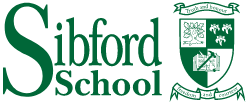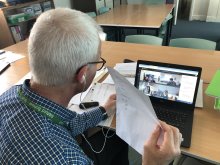



Back in June, parent and freelance writer Caroline Mills, visited Sibford to learn more about how we navigated virtual learning during lockdown and reopened the school safely and successfully. Her full article follows:
Sibford, the small, rural school bucked the national trend to record its highest ever pupil roll as it continued education and pastoral care during lockdown.
The coronavirus pandemic has had a significant impact upon the independent education sector with a number of high-profile closures including the prime minister’s former prep school, Ashdown House. However, a number of schools have gone from strength to strength with high numbers of admissions enquiries and indeed growth in numbers at this time. One rural school in north Oxfordshire has bucked the national trend and has grown to it’s highest pupil roll on record during this time of lockdown. Caroline Mills visited the school to find out more.
Finlay’s voice rises to a crescendo, assured, forceful in an instant before softening to a delicately wistful pause. His words, ‘empty chairs at empty tables’ resonate deeply, ‘where my friends will meet no more’. The Year 11 pupil is performing in a music meeting at Sibford School, a co-educational independent school in north Oxfordshire. I am watching via YouTube, and Finlay who in early March was singing in the ambitious school production of Les Misérables, is taking part in the meeting somewhere, but not on school premises. For it is lockdown and the school buildings are closed to all pupils with the exception of a handful of children from key worker families. There are, indeed, empty chairs at empty tables. But a sense of normality, in whatever format, is of great significance to the school and the music meeting is one of those shows that must go on.
Sibford School, which educates children from Nursery through to Sixth Form over a 50-acre rural campus on the edge of the Cotswolds, was founded by the Society of Friends in 1842. The Quaker ethos of respecting, nurturing and valuing the individual remains fundamental and underpins what is regarded as a Sibford Education today. Toby Spence, Head says, “The school’s rural location (just over an hour from central London), co-educational approach and strong focus upon pastoral care and values are at the heart of why parents are looking closely at a Sibford education at this time. Although we are primarily a day school, our full, weekly and occasional boarding gives further flexibility to many.”
Since its inception in 1842, the school has never closed, including during the First and Second World Wars when it remained open to pupils and evacuees eager for a safe and secure education in the countryside. The school was determined not to allow the current COVID-19 pandemic to shut it down, either. On the contrary, perhaps remarkably, the school has simply thrived.
In March, prior to any formal government announcement of school closures the school was in preparations to remain open and functioning via online platforms should such measures be necessary. By mid-March, parents and pupils at the school were already receiving notifications of how the school would function in the event of the lockdown that inevitably came.
Says Anna Jo Mathers, Assistant Head Learning and Teaching, “We were incredibly fortunate to have a parent that works for Microsoft. The sharing platform Microsoft Teams, which had initially been designed for business use, was suddenly thrust into our world of learning as a useful tool upon which we could continue daily school life.”
The use of Teams, together with the school’s existing daily management program, Firefly, has meant that, while the school premises have been shut, the Sibford Education has continued, including the pastoral care for which the school excels.
Since lockdown, pupils have been expected to attend registration online within their tutor groups at 8.40, just as they would were they in the school building. Each pupil continues to follow their school timetable and routine, with live lessons via Teams.
That has included mock examinations for Year 10, internal end-of-year assessments for all lower year groups, and Year 11 GCSE and Year 13 A level pupils who, once the end of formal teaching was complete to submit centre-assessed grades and rankings, have been in transition periods to prepare for future academic and life-skills activities.
Says Anna Jo Mathers, “Many lessons have been live and every pupil is expected to log on, with cameras and microphones on when necessary. It’s important that teachers can see and hear the pupils, to see their body language and reactions just as we would in a classroom situation. Pupils also value seeing the staff and hearing their voices.
“Lessons are recorded for staff and pupil safeguarding. However, recording has proved invaluable for those children that have missed a lesson; they can refer back, to catch-up.
“Class work, assignments and homework have been set online. Teachers can see who has opened documents, who has handed in work on deadline, who has needed extra time and, if a pupil hasn’t logged in, we can make contact to check they’re ok. It’s an important element of our pastoral care.”
It is this pastoral care and the attention to detail to ensure that the school’s deep-rooted sense of relationship and community are retained that has been most noticeable throughout the period of lockdown and now, as the school buildings begin to re-open to certain year groups. The whole of the Junior School building, from Early Years to Year Six has now reopened for the remainder of the summer term and, in the Senior School, Years 10 and 12 are in attendance, in tutor-group bubbles, on set days.
I visited the school on Year 10’s first day back on site this week, after the school’s dedicated weekly deep-clean day. The individual year-group reintroduction in the Senior School is, perhaps, a helpful soft-relaunch to allow the school to see how it will function with all pupils back on site latterly.
It was a joy to see these bright and bubbly teenagers have some socially-distanced interaction with one another over break-time (each pupil has their own chair in the main school hall to avoid cross-contamination) having gone through academic assessments, reports and target setting with their tutors.
Equally elated to see his pupils back was the Head, Toby Spence. Said Toby, “At the heart of Sibford School is relationships and community. The importance of receiving these year groups back in school now is not to extend the academic work already set online as we move towards the end of term but to have that social interaction and share the moments of community again, for staff to be able to assess the mental wellbeing of our pupils and show face-to-face concern for every pupil.”
That, says Anna Jo Mathers, has been one of the biggest challenges during the physical closure of the school. “Sibford has the attitude where we feel wholly responsible for the children and their wellbeing; we need each other.
However, Head of Pastoral Care, Tracy Knowles, has maintained online ‘drop-in’ sessions for pupils that want to ask questions or simply feel the need to chat. “We’ve had many conversations with pupils about how they are coping with lockdown, particularly during Mental Health Awareness Week at the end of May.
The pastoral team has also undertaken the mammoth task of individually telephoning the parents of all 450 pupils on roll for a brief chat to check that families are safe and well. Meanwhile, Ed Rossiter, Head of the Junior School, ensured that all Year 6 parent meetings were carried out, using Microsoft Teams.
What manifests itself clearly is the determination by all staff that every aspect of school life will continue regardless of the challenges of physical detachment. Pupils come together online for weekly House Meetings and inter-house competitions. Ed Rossiter delivers his weekly Junior School Celebration Meetings to announce Reader and Learner of the Week; the small boarding community come together weekly, too, and Head Toby Spence addresses the whole school just as he would during Meeting for Worship were all pupils on the premises, only by video link with the gratifyingly scenic views of the Cotswolds in the background.
The annual sports awards evening, rather than being cancelled, was conducted via Instagram, with members of the PE staff dressed in tuxedo and bow-tie presenting awards from the school playing field; peripatetic music lessons and LAMDA lessons continue to be delivered via Teams; #FridayFitness strength-and-conditioning sessions are delivered online in addition to timetabled PE lessons, and, for friends to keep in touch, Year 13 pupils sets the school community a Task Master Challenge every Saturday evening.
Curriculum Enrichment Week, which usually involves pupils heading off-campus for exciting, informal learning in the final week of term, will, this year, become Project Week. Pupils will be able to compete for their house team during a virtual sports day, with a set of challenges to be performed at home. The textiles department will use the week as the culmination of a term-long upcycling project that will incorporate a virtual fashion show, while the English and drama departments are combining to put on performances of Shakespeare.
The spiritual side of Sibford is hard to pin down in words, even for a writer or journalist. It’s an emotion that somehow seeps through the psyche and has perhaps been summed up best during lockdown by a little presentation to commemorate VE Day on 8th May. Released on YouTube to the soothing tones of dear Dame Vera Lynn, we see staff members of the Sibford community introduced in their home environments, among them the Head of Food Preparation and Nutrition cooks in her kitchen, the Head of Horticulture (yes, horticulture – Key Stage 4 children can study a City & Guilds in Horticulture in place of a GCSE while the school is one of a handful in the UK to offer the BTEC Level 3 Subsidiary Diploma in Countryside Management, equivalent to an A level) introduces his new baby daughter and Michelle, in the school’s reception, dances the Charleston.
Anna Jo Mathers states, “This little school on the hill that everyone loves so much is doing the most phenomenal things.” It is only a matter of time before Finlay’s friends will be able to meet again at the no longer empty chairs and tables.
It was such a pleasure to visit the school which strikes me as a beacon of light at this time of so much darkness. The deeply held values, adaptability and resilience of the school community goes some way to explain that it is not all doom and gloom for high quality education in the independent sector.
To see if Sibford is the right school for your child we invite you to access our virtual open events and see a guided tour of the school. You can also book a 1:1 virtual meeting with either Head, Toby Spence, Head of Junior School, Edward Rossiter or, Head of Sixth Form, Cate Mallalieu-Needle.
To book, please contact Elspeth, Admissions officer here.
